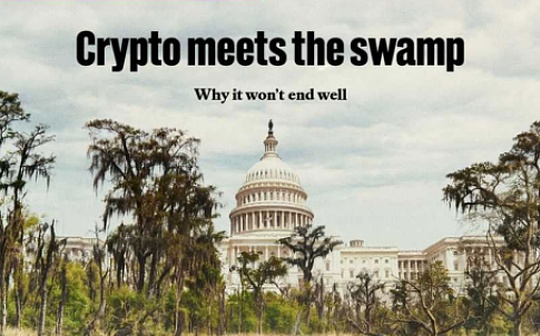
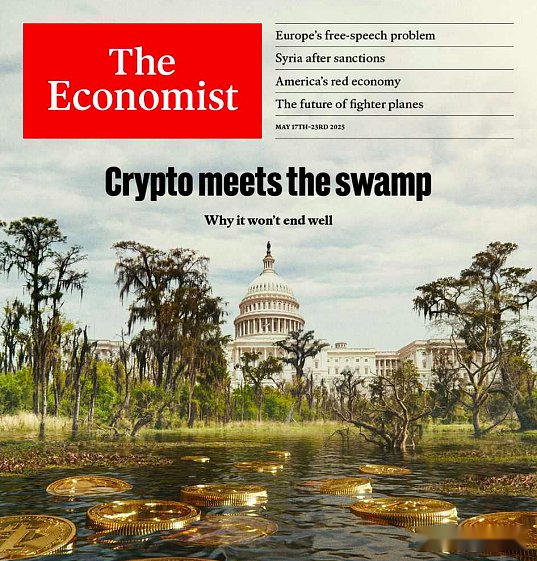 Source: Economist; Compilation: AIMan@Bitchain Vision
Source: Economist; Compilation: AIMan@Bitchain Vision
Editorial: Cryptocurrency has become the ultimate swamp asset
An industry that dreams beyond politics has become synonymous with selfishness.
When the Qatar administration proposed to replace Air Force One with a Boeing 747, President Donald Trump responded: Why not?Only fools will refuse free money.No presidential term in modern history has caused so many conflicts of interest at such a rapid pace.However,The worst selfish behavior in American politics does not happen on the runway, but on the blockchain——The location of trillions of dollars in cryptocurrencies.
Over the past six months, cryptocurrencies have played a new role at the center of public life in the United States.Some cabinet officials have invested heavily in digital assets.Cryptocurrency enthusiasts participate in the management of regulatory agencies.The industry’s largest businesses are one of the biggest donors to the campaign, with exchanges and issuers investing hundreds of millions of dollars to defend friendly lawmakers and attack opponents.The president’s sons peddled their cryptocurrency investments around the world.The biggest investor in Trump’s Meme coins has the opportunity to have dinner with the president.The first household’s holdings of crypto assets are now worth billions of dollars, making cryptocurrencies likely the largest single source of their wealth.
This is quite ironic considering the origins of cryptocurrencies.When Bitcoin was born in 2009, it was welcomed by a utopian anti-authoritative movement.Early adopters of cryptocurrencies had lofty goals to revolutionize the financial system and protect individuals from asset plunder and inflation.They want to hand over power to small investors who otherwise would be subject to large financial institutions.This is not just an asset, but also a technological liberation.
All this has been forgotten now.Cryptocurrencies not only fuel large-scale fraud, money laundering and other types of financial crimes.The industry also has a dirty relationship with the U.S. government administration, which is more than Wall Street or any other industry.Cryptocurrency has become the ultimate swamp asset.
In sharp contrast to the situation outside the United States.In recent years, different jurisdictions such as the EU, Japan, Singapore, Switzerland and the UAE have successfully given new regulatory transparency to digital assets.While these jurisdictions do so, there is no rampant conflict of interest as in the United States.In developing countries, government requisitions are common, inflation is the highest, and the risk of currency depreciation is also very serious, but cryptocurrencies still play the role that early idealists hope.
All this happens when the underlying technology of digital assets is gradually maturing.Despite the still large speculation, mainstream financial companies and tech companies are gradually paying attention to cryptocurrencies.In the past 18 months, real-world assets including private credit, U.S. Treasury bonds and commodities have been “tokenized” and traded on the blockchain.Traditional financial institutions such as BlackRock and Franklin Templeton are large issuers of tokenized money market funds.Cryptocurrency companies are also involved in issuing tokens pegged to assets such as gold.
Perhaps the most promising use is payment companies.Some companies are embracing stablecoins (digital tokens backed by other more traditional assets).In the past month alone, MasterCard has announced that it will allow customers and merchants to use stablecoins for payments and settlements.Fintech company Stripe has launched stablecoin financial accounts in 101 countries.Stripe also acquired the stablecoin platform Bridge this year.Meta may try again after giving up the Diem project for three years.
This is an opportunity that cryptocurrency companies must seize when they are at risk.Supporters argue that when Joe Biden entered the White House, they had no choice but to do everything in the United States.Under Gary Gensler, the U.S. SEC is pessimistic about the industry, placing many of the most famous companies in law enforcement actions and legal cases.Banks were so scared that they dared not provide services to cryptocurrency companies, nor did they dare to get involved in cryptocurrencies, especially stablecoins.In this sense, the industry makes sense.Clarifying the legal status of cryptocurrencies through courts rather than Congress is neither particularly effective nor always fair.The regulatory pendulum has now swung violently, moving in the opposite direction, with most cases against cryptocurrency companies being dropped.
The result is that cryptocurrencies need to be saved in the United States.New rules still need to be formulated to ensure that risks are not injected into the financial system.If politicians fail to properly regulate cryptocurrencies because they fear the industry’s electoral influence, the long-term consequences will be harmful.The danger of setting too few protective measures is not just theoretical.The three largest banks that went bankrupt in 2023 – Silvergate, Signature and Silicon Valley Bank – all have substantial exposure to floating deposits in the cryptocurrency industry.Stablecoins are susceptible to runs and should be regulated like banks.
Without such a change, the leader in the cryptocurrency field will eventually regret the agreement reached in Washington.The industry is mostly silent about the conflicts of interest caused by Trump’s family’s cryptocurrency investment.Legislation is needed to clarify the status of industries and assets and provide cryptocurrency companies with the more rational regulatory security they have long expected.The interweaving of the president’s business interests and government affairs has made this even more difficult.On May 8, the bill failed to pass in a procedural vote in the Senate as multiple Democratic senators and three Republican senators withdrew their support for a cryptocurrency bill.(Translator’s note: The GENIUS bill has received enough senators to vote to end the debate.)
Me, me, Meme
Any industry so closely linked to a certain political party cannot be immune to the mood swings of American voters.The industry hailed Trump as a savior and became a popular “swamp asset”, indicating that it has taken the sidelines.Cryptocurrencies play a new role in policy making.But today, the reputation and destiny of the industry are closely related to the rise and fall of its political benefactors.Cryptocurrencies have been good for the Trump family.But in the end, the benefits of this deal will only be one-way.
Text: The cryptocurrency industry suddenly becomes the core of American politics
Thanks to the Trump family’s investments, friendly regulators and generous election spending.
In late April, Fr8Tech, a Texas logistics company with a market value of about $3 million, launched an unusual investment.The company said it would borrow up to $20 million to buy TRUMP Meme, a cryptocurrency launched by Donald Trump three days before starting his second presidency.(He urged on social media: “Join my very special Trump community. Get your $TRUMP coin now.”) The company that manages TRUMP coin just announced that the biggest investor in the Meme coin will be invited to have dinner with the president at the end of May.Fr8Tech CEO Javier Selgass said buying the token would be an “effective way” to “advocate” the trade policy Fr8Tech hopes for.
The same week, on the other end of the world, the night sky of the Pakistani city of Lahore was illuminated by fireworks.The Pakistan Cryptocurrency Commission, established by the Finance Minister in March to promote the “digital assets” industry, is celebrating its cooperation with World Liberty Financial (WLF).WLF is a company belonging to Mr. Trump and his family.WLF promises to help Pakistan develop blockchain products, convert real-world assets into digital tokens, and provide broader consultation on the cryptocurrency industry.The specific details of the agreement, including financial terms, were not disclosed.Indian media interpreted the deal as Pakistan’s attempt to win Trump’s favor — a reading that became even more embarrassing two weeks later when Trump attributed himself a ceasefire in the rapid escalation of the Indian-Pakistan military conflict.Many Indians believe that the truce is too favorable for Pakistan.
These two events are signs of a change in Washington.Cryptocurrencies are in a rising period.The president, his wife and children all promote it at home and abroad.The regulator appointed by Trump has taken a more relaxed approach to it.Investors are flocking in.Large pressure groups emerge like mushrooms after a rain, support political candidates who advocate cryptocurrencies and punish those opponents.Investors and advocates, including foreign governments, have found that this can provide access to people with wide connections.This young industry suddenly found itself at the heart of public life in the United States.But its close connection with the Trump family has also turned it into a partisan cause to some extent.Trump’s enthusiasm for cryptocurrencies may ultimately do more harm to the industry.
Over the years, many industries have become entangled with the political class.Banks, arms manufacturers and large pharmaceutical companies have long maintained an influence in the corridors of power.In the late 19th century, railway companies exerted a huge influence on national and local politics, gaining favorable supervision, leading to a huge prosperity and a catastrophic depression.
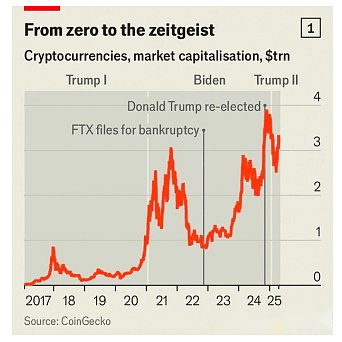
Figure 1
But no industry has become the official darling with an astonishing speed from a nearly “untouchable” position like cryptocurrencies.At the beginning of Mr. Trump’s first term, the total value of all cryptocurrencies worldwide was less than $20 billion.It has now exceeded $3 trillion (see Figure 1).When Mr. Trump nominated Jay Clayton as chairman of the Securities and Exchange Commission in 2017, cryptocurrencies were not mentioned at its Senate confirmation hearing.Just in 2021, the president still despises digital assets.”Bitcoin looks like a scam,” he said of the largest cryptocurrency Bitcoin, and “I don’t like it because it’s another currency that competes with the US dollar.” His views seemed to be confirmed the following year, when the price of digital assets plummeted and the $8 billion fraud case on the large cryptocurrency exchange FTX, heralds the industry into a downturn known as the “crypto winter.”
Regulators are also pessimistic about many crypto assets.Gary Gensler, SEC chairman under Trump’s former President Joe Biden, insists that many cryptocurrencies are actually securities and should therefore only be traded on exchanges regulated by the SEC.The agency immediately sued large cryptocurrency trading sites like Coinbase and Binance, as well as many other digital asset companies.
However, since Mr. Trump’s return to the White House, financial regulators who tried to curb cryptocurrencies during Biden’s administration have suddenly become keen to support it.This is because Mr. Trump has appointed a firm believer to lead them.The new SEC chairman Paul Atkins has served as co-chair of a crypto industry organization for eight years.Mr. Trump nominated Chairman of the Commodity Futures Trading Commission (another financial regulator), Brian Quintenz, was previously the head of crypto policy for the well-known venture capital firm A16z.
Changes in the leadership of the US SEC have led to a huge policy shift.It now takes a far narrow view of which crypto assets belong to securities and therefore the scope of regulation.Hester Peirce, who is in charge of the committee’s newly formed crypto task force, is affectionately known as “crypto mom” in the industry.More than a dozen enforcement actions against crypto companies have been stopped since Mr. Trump took office, including against two major exchanges, Coinbase and crypto.com, Ripple Labs, one of the largest cryptocurrencies, and Kraken, the first crypto company to obtain a state bank license.All of this naturally boosted the industry: Venture Capital Funds invested nearly $5 billion in crypto companies in the first three months of 2025, the highest amount in nearly three years.
When the new president takes office and arranges like-minded officials, a major regulatory reversal is not unheard of.When the Republican government replaced the Democratic government, the pendulum often turned from intervention to laissez-faire.What is unusual, however, is the president and his family deeply involved in this industry that benefits from the relaxation of regulation.
It was just starting a few months ago, and the presidential family’s investment in the cryptocurrency sector is increasing day by day.WLF, a 60% stake in the Trump family, was established in September 2024.The company announced in March 2025 a new stablecoin, a cryptocurrency pegged to the value of another asset, usually the US dollar.The token, called USD1, has a market capitalization of over $2 billion, making it one of the largest dollar-pegged cryptocurrencies in the world.
Mr. Trump’s main foreign policy “trader” Steve Witkoff is the “honored co-founder” of WLF; his son Zach Witkoff is the “co-founder”.Mr. Trump himself is the “chief crypto advocate.”His sons are in the “team”.A footnote on its website warns: “Any reference, citation or image related to Donald J. Trump or his family members should not be interpreted as endorsement.” A spokesperson said the WLF is a private enterprise without any political background and no one in the Trump administration serves in its management.
In addition to WLF, Mr. Trump also owns other crypto assets.There is also TRUMP Meme, a cryptocurrency created to exploit trends or jokes, whose value soared after its launch on January 17, with a market value peaking at about $15 billion at one point before plunging to a small part of that figure.Companies associated with the Trump family own 80% of these tokens.President’s wife Melania Trump launched another Meme coin on January 19.Its value also soared and then collapsed (see Figure 2).
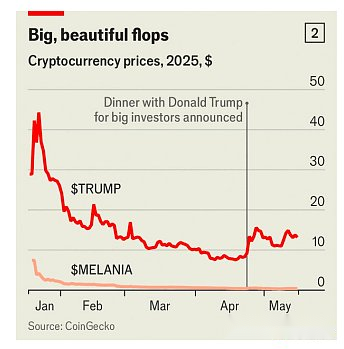
Figure 2
The president also has direct financial interests in the cryptocurrency space through Trump Media & Technology Group, a social media company that owns 52% of Trump’s shares.In April, Trump Media and Technology Group announced a partnership with Crypto.com, a company that recently dropped the case by the SEC, to sell exchange-traded funds (ETFs) involving digital assets and other securities.Trump Media & Technology Group said it is also considering launching its own crypto wallets and currencies.
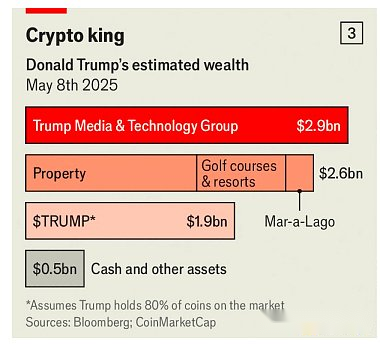
Figure 3
The volatility of these assets and uncertainty in ownership make it difficult to determine how much wealth the Trump family is tied to these investments.Cryptocurrencies may now form the family’s largest single business line.The family-owned TRUMP Meme coins are worth nearly $2 billion, which is almost the same as the sum of all its properties, golf courses and clubs.(See Figure 3).
It’s not just the Trump family that helped revive cryptocurrency.Large electoral pressure groups (called super PACs in the jargon) have been investing heavily to promote the interests of the industry.The network of super PACs, which are linked to Protect Progress, Fairshake and Defend American Jobs, spent more than $130 million on the eve of last year’s election, making it one of the most-spending groups on the campaign.All of this was formed after the last presidential election.With $260 million in revenue in the last election cycle, Fairshake is not only the largest PAC that advocates for a specific industry, but also the largest nonpartisan super PAC of all types.By comparison, the National Association of Real Estate Brokers raised about $20 million.Ripple and Coinbase are Fairshake’s largest corporate donors, while Andreessen Horowitz’s Mark Anderson and Ben Horowitz are the largest individual donors.
Fairshake doesn’t emphasize candidates’ perception of cryptocurrencies, but instead advertises on any issues that may boost their favor or hinder politicians they dislike..It has helped her lose in the California Senate primary through an ad criticizing California Democratic Congresswoman Katie Porter for trying to sell her campaign donor list.Another ad supporting New York State Rep. Pat Ryan praised his tough stance in combating crime.“Many industries have tried this approach.The difference is its single focus, which is where the game changes,” said Josh Vlasto, spokesman for Fairshake. “The founding strategy and remains: supporters, opponents.”
“This is the most naked display of money and power in the legislature I have ever seen.“Amanda Fischer, chief operating officer of Better Markets, a lobbyist that advocates strengthening U.S. financial regulation. Ms. Fischer was also the chief of staff for Biden’s SEC chairman Gensler. Fairshake alone has $116 million in cash and is ready to deploy in the 2026 midterm elections.
The crypto industry’s daunting “war funds” should help it convince Congress to adopt its preferred policies.Most importantly, it hopes Congress will clarify the legal status of crypto assets to prevent the regulatory pendulum from deviating again in future elections.After all, the president and his appointed officials come and go; legislation tends to last longer.
The crypto industry’s preference is to declare most cryptocurrencies as commodities, regulated by the Commodity Futures Trading Commission (CFTC) rather than as securities by the SEC.The CFTC regulates transactions in most financial derivatives and is one of the much smaller of the two regulators.During the fiscal year, it applied for a budget of $399 million and 725 full-time employees, while the SEC’s budget was $2.6 billion and 5,073 employees.The crypto industry sees it as a looser form of regulation.
A bill that uses the CFTC as the main regulator of cryptocurrencies was blocked in Congress last year.But Republicans who tend to be lighter financial regulation have been controlling both houses since January.More importantly, many Democrats acknowledge the benefits of putting crypto assets on a clearer legal basis.However, the Trump family’s crypto-craze is making it harder for the industry to win enough support in Congress.
Mr. Trump’s obvious conflict of interest has sparked a wave of criticism from Democratic lawmakers.They believe that many investors do business with the Trump family or buy crypto assets related to Trump simply to please the president.In fact, they are accusing Mr. Trump of selling power.For example, they noted that the price of TRUMP Meme coins soared after announcing the announcement of a dinner with Mr. Trump for big investors.Another storm involved MGX, an investment company established by the Abu Dhabi government, decided to use WLF’s USD1 as a tool to invest $2 billion in Binance.Using cryptocurrencies to fund investments of such a large scale is unusual in itself.The business logic of using such a brand new and untested cryptocurrency is even less clear.But WLF has benefited greatly: This deal has made USD1 leap from obscurity to the seventh largest stablecoin in the world.
On May 8, a bipartisan bill creating a clear regulatory framework for stablecoins failed to receive Senate approval.Advocates of the bill have been confident that it has passed.But Democrats who previously seemed to be positive about it began to worry that it might fuel what they think the president would be selling influence.Two Democratic Senators Jeff Merkley and Chuck Schumer have introduced a bill that aims to prevent the president, members of Congress and senior White House officials from issuing, sponsoring or endorsing crypto assets.Even Republican Senator Cynthia Lummis, who has been actively advocating clear cryptocurrency regulation and is a co-sponsor of the bill, told ABC NBC that Mr. Trump’s Meme Dinner “makes me hesitation.”
Concerns about cryptocurrency regulation are not limited to the president’s connection to the industry.Steven Kelly of Yale’s Financial Stability Program (part of Yale) believes that a rapidly growing crypto industry regulated by a small regulator that pursues non-interference may pose risks to financial stability.He pointed out that cryptocurrencies are at the heart of the crisis that shocked the U.S. banking industry in 2023.Banks that started the crisis — Silvergate, Silicon Valley and Signature — had a lot of business dealings with crypto companies and investors, and were hit hard by the crypto winter.As concerns about their losses evolved into runs, panic quickly spread to the wider financial system.For skeptical analysts, normalizing the use of unstable crypto assets will inevitably inject greater danger into the financial system.Another Democratic Senator Elizabeth Warren said the stablecoin bill would increase the risk of financial collapse.
Publicly, cryptocurrency advocates remain optimistic that the industry will receive supportive legislation.Privately, however, some industry leaders are harshly critical of the president’s crypto-risk behavior.They fear that the appearance of the industry becoming a tool for presidents to peddling influence will prevent legislators from supporting favorable legislation.Nic Carter, a prominent crypto industry investor and a supporter of Mr. Trump, is one of the few willing to publicly say that the president’s family’s economic interests in the crypto industry are making crypto-friendly legislation harder to get approval.He said the White House responded poorly to such criticisms.“I talked about this and people from the Trump administration contacted me and expressed dissatisfaction with it.” However, it is unlikely that it will work for those who have stated obvious facts to shut up.“The conflict is real,” Mr. Carter said.“No one can really object to this.”






